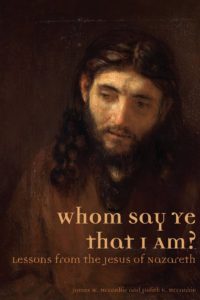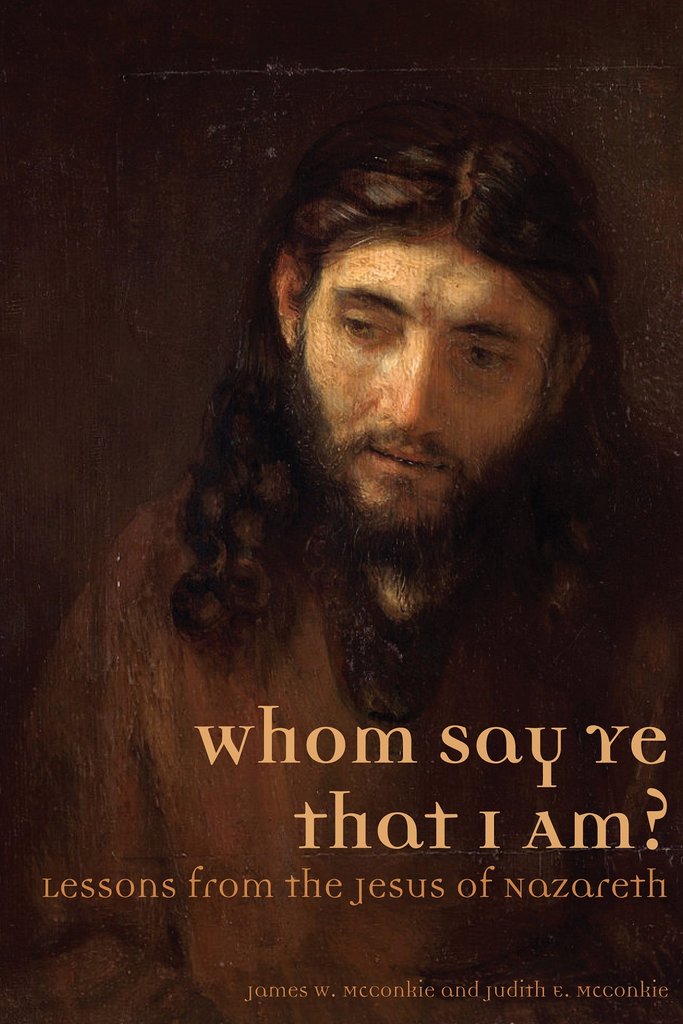 James and Judith McConkie have taken a deep dive into something relatively few Mormon scholars and teachers have researched: the historical Jesus. Latter-day Saints have been doing scripture studies for years, and are in the past few decades beginning to contribute their own studies to the growing body of work on the Bible, but only a handful have attempted to dive into the vast literature on the subject of just who Jesus of Nazareth was in his time and setting, studies that seek to understand his life and teachings in the context of his ministry in what is now Palestine and among a colonized people ruled from Rome through the cooperation of many Jewish leaders. One result of their many years of study to discover for themselves and, initially, their family, is a new book, Whom Say Ye That I Am?: Lessons from the Jesus of Nazareth (Greg Kofford Books, 2018).
James and Judith McConkie have taken a deep dive into something relatively few Mormon scholars and teachers have researched: the historical Jesus. Latter-day Saints have been doing scripture studies for years, and are in the past few decades beginning to contribute their own studies to the growing body of work on the Bible, but only a handful have attempted to dive into the vast literature on the subject of just who Jesus of Nazareth was in his time and setting, studies that seek to understand his life and teachings in the context of his ministry in what is now Palestine and among a colonized people ruled from Rome through the cooperation of many Jewish leaders. One result of their many years of study to discover for themselves and, initially, their family, is a new book, Whom Say Ye That I Am?: Lessons from the Jesus of Nazareth (Greg Kofford Books, 2018).
In this episode, the McConkies join Mormon Matters host Dan Wotherspoon for a discussion of the book, literature on Jesus within Mormonism, discoveries they made that surprised or inspired them, and much more. Specifically, they focus on several areas discussed within the work: Jesus and his interactions with women and (with and about) family, his teachings and views on suffering in this world, the systematic injustice during his time and teachings about the “kingdom of God” he was attempting to usher into being, and finally discipleship and covenanting.
Be warned: This is a terrific discussion that is sure to tease you into buying this book and many others mentioned herein! This is fascinating literature and a rich and wonderful area to dive into ourselves, one that yields many good dividends for our own spiritual walks.
_____
Links:
James W. McConkie and Judith E. McConkie, Whom Say Ye That I Am?: Lessons from the Jesus of Nazareth (Greg Kofford Books, 2018)
Marcus J. Borg, Meeting Jesus Again for the First Time: The Historical Jesus and the Heart of Contemporary Faith
Marcus J. Borg, Reading the Bible Again for the First Time: Taking the Bible Seriously But Not Literally
Marcus J. Borg, Jesus: The Life, Teachings, and Relevance of a Religious Revolutionary
N.T. Wright, Simply Jesus: A New Vision of Who He Was, What He Did, and Why He Matters
N.T. Wright, The Challenge of Jesus: Rediscovering Who Jesus Was
N.T. Wright, Surprised by Scripture: Engaging Contemporary Jesus
James Martin, Jesus: A Pilgrimage
John Dominic Crossan, Jesus: A Revolutionary Biography
Karen Jo Torjesen, When Women Were Priests: Women’s Leadership in the Early Church and the Scandal of their Subordination in the Rise of Christianity


Comments 2
Heard a few years ago that this book was in the works, really looking forward to reading it. Knew Jim and Judy in a married students ward at the U of U. They were outstanding even then. I liked theit thoughts on social justice and the family of God especially.
Enjoyed podcast until the reveal of the idea and opinion that capitalism is
somehow in opposition to Jesus’s idea of the Kingdom of God. I reject any government system, to date, devised by human invention that is even comparable to Jesus’s idea of the Kingdom. Capitalism may have its faults and fails to meet every single participants needs. Nevertheless, the implication that socialism or comminism ( or any earthly government) has equivalence to the ideal that Christ was intending is a distortion of truly understanding the Kingdom of God. Unless there could be a VOLUNTARY admission of individuals that work under a unified theocratic principle such a system and its associated institutions will meet the same fate that history has so revealed. If anything we learn from the past is that earthly institutions attempting a shadow of communal and socialized structures lead to tyrants, poverty and millions of deaths. Even in its best cases there is still great disparity between the working class and powerful elites in non capitalistic systems too.
The guest implied his reluctance and warning, in the early part of the podcast, that he wanted to deflect the current presentism and paradigm into the historical understanding that is being extracted from the Gospels text. A great ideal I would agree. However, the reality was a supposition that the nuclear family somehow is negated by the few words that Jesus mentioned in the selected canonization and that capitalism is rejected without mentioning what mankind institution could provide a better alternative.
I had all intention to even purchase their book but felt the authors may have an agenda to present justification from the historical Jesus of the current progressive political constructs that exist in today’s political realm. Just my opinion of course and would be interested if I am alone in my suspicion.
In whole I did enjoy some of the morsels of information presented and was provoked to think deeper on these subjects. However, in my opinion, was just a little turned off with some narrow conclusions and felt a wider range of hypothesis could have been explored.
Thanks for another interesting podcast! This was a miss for me personally but two out of three is still a descent track record for all of the presentations that the Mormon Matters podcast that I have listened to.